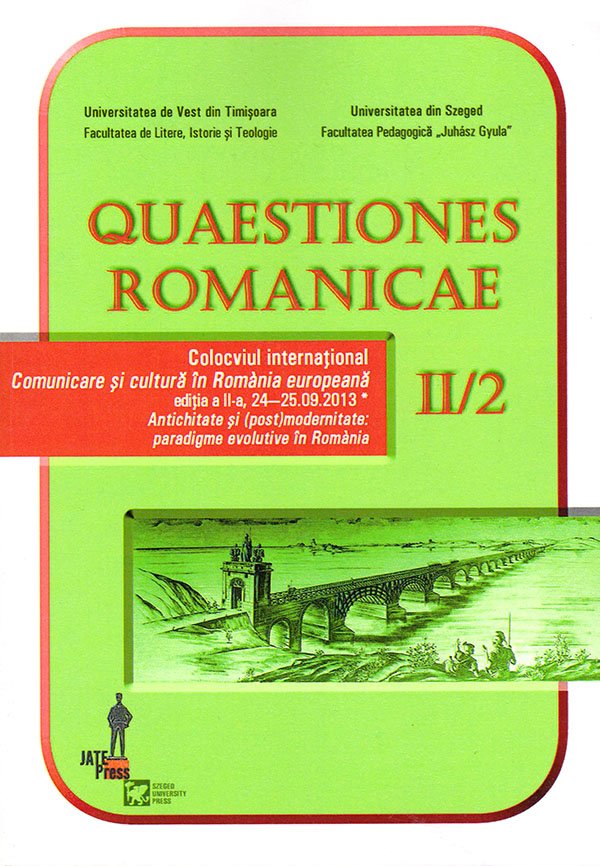Funciones sintácticas del infinitivo en español y rumano
Abstract: (Syntactic Function of the Infinitive in Spanish and Romanian Languages) The present paper focuses on an area of the field of grammar, a simple topic at first glance, but actually quite complex for those who have the patience to treat it with due care and enthusiasm. The syntactic functions of the Spanish infinitive are treated quite extensively; then, these functions are compared to the modal forms of the Romanian infinitive, as both are closely related Romance languages. Taking as a starting point some definitions that allude to the syntactic functions of the Spanish verb in the infinitive, we offer relevant examples selected both from scholarly writing and from Spanish literature. At the same time, we mention papers and works that present the topic of syntactic functions of the infinitive in Romanian and we offer examples from Romanian literature. The comparative analysis of the Romanian and Spanish infinitive is based on the analogy between the syntactic functions; however, we equally refer to the morphological level. We note the specific differences that exist between the two languages through translation from Spanish into Romanian and not the other way around, for the simple reason that any Romanian infinitive can be translated with an infinitive in Spanish. However, not all Spanish infinitives have a direct Romanian equivalent. We highlight the syntactic functions of the Spanish infinitive because this verbal form is much more frequent in the aforementioned language. The morphological form of the Spanish infinitive is much more complex and its most important feature lies in its permanent verbal nature. The Spanish infinitive performs the same syntactic functions as the Romanian infinitive; however, its use is much more diverse from a statistical and stylistic point of view, as it is more frequently encountered than its Romanian counterpart.
Keywords: grammar, syntactic function of infinitive, comparative analysis, Spanish, Romanian.
Resumen: El presente trabajo se centra en una zona del campo de la gramática, un tema sencillo a primera vista pero, en realidad, bastante complejo para quien muestra la disponibilidad para tratarlo con debida atención y entusiasmo. Se despliegan en un espacio bastante extenso las funciones sintácticas del infinitivo español y se comparan, en el plano funcional, con las formas modales del infinitivo rumano, siendo los dos idiomas lenguas romances estrechamente relacionadas entre sí. Tomando como punto de partida definiciones que aluden a las funciones sintácticas del verbo español en infinitivo, ofrecemos ejemplos edificantes seleccionados tanto de los trabajos de especialidad como de la literatura española. Al mismo tiempo, mencionamos artículos y obras que presentan el problema de las funciones sintácticas del infinitivo en la lengua rumana y ofrecemos ejemplos de la literatura rumana. El análisis comparativo del infinitivo rumano y español se basa en la analogía de las funciones sintácticas pero, en igual medida, nos referimos también al carácter morfológico. Señalamos las diferencias específicas existentes en las dos lenguas por medio del método de la traducción del español al rumano, y no al revés, por el simple hecho de que cualquier infinitivo rumano puede ser traducido por un infinitivo en español. En cambio, no cualquier infinitivo del español tiene un equivalente infinitivo en rumano. Destacamos las funciones sintácticas del infinitivo español porque esta forma verbal, en la lengua española, es mucho más frecuente y utilizada. El aspecto morfológico del infinitivo español es más complejo y la característica más importante la representa su carácter verbal que conserva siempre. El infinitivo español desempeña las mismas funciones sintácticas que el infinitivo de la lengua rumana, pero su uso es más diversificado, desde el punto de vista estadístico y estilístico siendo más frecuente y generalizado que el infinitivo rumano.
Palabras clave: gramática, funciones sintácticas del infinitivo, análisis comparativo, español, rumano.
